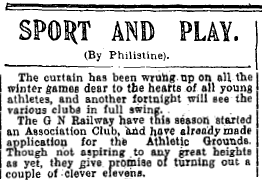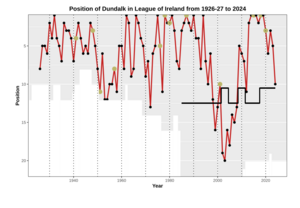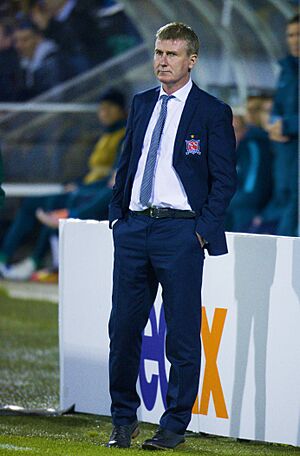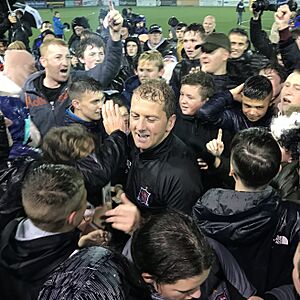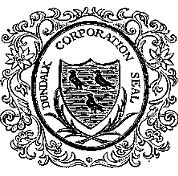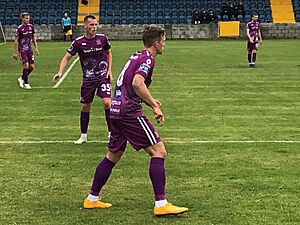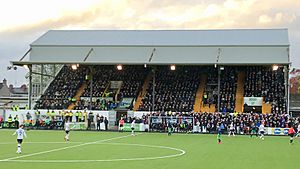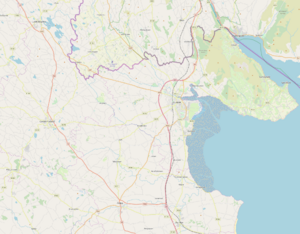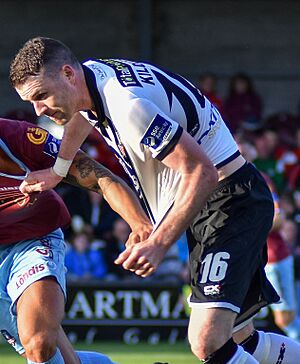Dundalk F.C. facts for kids
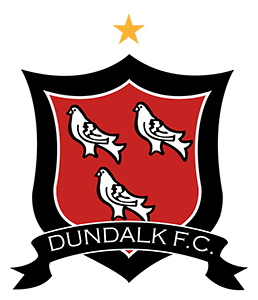 |
|||
| Full name | Dundalk Football Club | ||
|---|---|---|---|
| Nickname(s) | The Lilywhites The Railwaymen (original) |
||
| Short name | DFC | ||
| Founded | September 1903 as Dundalk G.N.R. Association Football Club |
||
| Ground | Oriel Park | ||
| Capacity | 4,500 (3,100 seated) | ||
| Coordinates | 54°00′00″N 06°25′00″W / 54.00000°N 6.41667°W | ||
| Owner | Dundalk Town FC Ltd (John Temple-led consortium) | ||
| Chairman | John Temple | ||
| Manager | Ciarán Kilduff | ||
| League | League of Ireland First Division | ||
| 2024 | League of Ireland Premier Division, 10th of 10 (relegated) | ||
|
|
|||
Dundalk Football Club is a professional football team that plays in the League of Ireland First Division. The club started in 1903 as Dundalk G.N.R., which was the team for workers of the Great Northern Railway. The club is based in Dundalk, County Louth, and their home stadium is Oriel Park.
The club's badge shows three martlets (birds without feet) on a shield. This design comes from the town's coat of arms. Dundalk's traditional home kit colours are white shirts, black shorts, and white or black socks.
Dundalk was a junior club until 1922. They joined the League of Ireland in 1926. Six seasons later, they became the first club from outside Dublin to win the league title. As of 2024, they have won 47 national trophies. This includes 14 League titles and 12 FAI Cups. They are the only club to have won a league title or an FAI Cup in every decade since the 1930s.
Dundalk first played in European competitions in 1963. That season, they became the first Irish team to win an away match in Europe. Their best performance in the European Cup was in 1979–80, when they reached the last 16. They also reached the last 16 of the European Cup Winners' Cup in 1981–82.
Dundalk is the only Irish club to have reached the Europa League group stage more than once. In 2016–17, they were the first Irish team to earn points and win a match at that level in Europe. They are still the only Irish team to have earned points in the Europa League group stage.
Contents
Club History
Early Years (1903–1930)
Dundalk Great Northern Railway (G.N.R.) Football Club started as a rugby football club in 1883. In September 1903, they switched to association football, which is the sport we call soccer today. The new club was known as "the Railwaymen." They played their home games at the Dundalk Athletic Grounds.
The club joined the first Dundalk and District League in 1906. After a break, they rejoined the local league in 1913. During World War I, the local league stopped, but the G.N.R. club played in other cup competitions. They reached their first cup final, the Leinster Junior Cup, in 1920, but lost.
Because of their good junior record, they were invited to join the Leinster Senior League in 1922. After four seasons, they were chosen to join the League of Ireland in 1926. This was a big step for the club.
On August 21, 1926, they played their first league match. By this time, the team was not just for railway workers anymore. In 1927, they changed their colours to white shirts and blue shorts. They also added the town's coat of arms to their badge. In 1930, the club officially changed its name to 'Dundalk A.F.C.'
First Big Wins (1930–1949)
With a new manager, Steve Wright, Dundalk finished second in both the League and the FAI Cup in 1930–31. This showed they could compete at a national level. In 1932, the club became a limited company called 'Dundalk A.F.C. Limited'.
In the 1932–33 season, Dundalk made history. They became the first team from outside Dublin to win a league title. They won it by beating Bohemians in Dalymount Park. This also made them the first team from outside Dublin or Belfast to win a league title in Ireland since 1890.
To earn more money, the club moved from the Athletic Grounds. In 1936, they got land on Carrick Road and named their new home 'Oriel Park'.
After winning the league, they were runners-up many times in different competitions. Their first cup final win was the 1937–38 City Cup. They won their first FAI Cup in 1942, beating Cork United in Dalymount Park. A few weeks later, they won the first Dublin and Belfast Inter-City Cup, becoming "Champions of All Ireland."
In the mid-1940s, the club sold players to English clubs to help with money. In 1948, they invested in professional players from Scotland and a player-coach, Ned Weir. This helped them win the City Cup for a third time and their second FAI Cup in 1949, beating Shelbourne.
Challenges and Comeback (1950–1964)
After 1949, the club faced financial difficulties and had to let go of many players. Despite this, Dundalk won the Leinster Senior Cup for the first time in 1950–51. They struggled in the league, finishing near the bottom in 1951–52. However, they had an amazing FAI Cup run, winning it for the third time in 1952 by beating Cork Athletic.
The club continued to struggle in the league for the rest of the 1950s. But they won their fourth FAI Cup in 1958, beating Shamrock Rovers 1–0.
By the end of the 1950s, Dundalk started to improve. With new player Jimmy Hasty, they became competitive again. They won their second Leinster Senior Cup in 1960–61. Then, in 1962–63, they won their first league title in 30 years.
This league win meant Dundalk played in European competitions for the first time. In 1963–64, they became the first Irish team to win an away game in Europe, beating FC Zurich 2–1. They finished second in the league that season and won the Top Four Cup for the first time.
New Ownership and Success (1964–1974)
After a tough 1964–65 season, the club decided to hire a modern manager. They appointed Gerry Doyle. However, results didn't improve much. The club was losing money and needed to invest in Oriel Park. In January 1966, a new company took over the club.
The new board invested a lot in Oriel Park and the team for the 1966–67 season. They signed a new player-coach, Alan Fox. This paid off immediately. Dundalk won their first League of Ireland Shield and then the league title by seven points. They also won the Top Four Cup, completing their first "treble" of trophies in one season.
In 1967–68, Oriel Park hosted its first European match under new floodlights. Dundalk won the Dublin City Cup that season. After Fox left, the team finished second in the league and won another City Cup.
Liam Tuohy became manager in 1969. He had to reduce the team's costs because of the club's debts. His team won the Shield in 1971–72 and the Leinster Senior Cup in 1970–71. Tuohy left in 1972, unhappy with the lack of local support.
Dundalk struggled after Tuohy left. A new board took over and hired John Smith as player-manager. Smith won a Leinster Senior Cup in his first season.
A Golden Era (1975–1995)
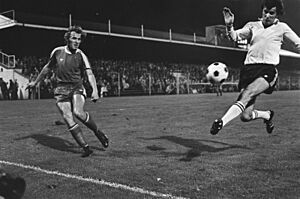
Jim McLaughlin became player-manager in November 1974. Under him, Dundalk reached new heights. He won his first league title (the club's fourth) in 1975–76, losing only one match. This brought European football back to Oriel Park. In the 1976–77 European Cup, they played PSV Eindhoven. Oriel Park then had an unbeaten run of eight European matches over the next five seasons. They won the Leinster Senior Cup and their first FAI Cup since 1958 in 1977.
McLaughlin's second league title came in 1978–79. They also won the FAI Cup, completing the club's first League and Cup "Double." The next season, 1979–80, they had their best European run until 2016, narrowly losing to Celtic in the European Cup.
They finished second in the league for the next two seasons. In 1980–81, they won both the League Cup and the FAI Cup. McLaughlin's third league title was in 1981–82. He resigned in May 1983.
Former player Turlough O'Connor became manager in 1985. He quickly built a strong team. They won the League Cup in 1987. In 1987–88, they won their second League and Cup "Double." The league title was won on the very last day of the season.
O'Connor won his second League Cup in 1989–90. Another league title followed in 1990–91, won in a final match against Cork City. However, the club faced financial problems in the early 1990s as attendance dropped. O'Connor resigned in 1993.
Dermot Keely took over. Despite financial issues, Keely led his team to the club's ninth league title in 1994–95 on a dramatic final day. They needed to win their match and for other teams to lose, and it all worked out.
Decline and Comeback (1995–2012)
The 1994–95 title didn't stop the club's decline. Keely left in 1995–96. Dundalk struggled and were relegated from the top league for the first time in 1998–99.
A supporters' group took over the club in 2000. They won the First Division title in 2000–01 and were promoted. However, they were relegated again the next season. Despite this, they won their ninth FAI Cup in 2002, beating Bohemians.
Dundalk spent the next four seasons in the lower division. In 2006, they finished second and won a play-off, but were still denied promotion. In 2008, they finally won promotion back to the Premier Division.
Dundalk became stable in the Premier Division. They qualified for the Europa League in 2010. But results got worse, and the club faced financial trouble again in 2012. Local businessmen Andy Connolly and Paul Brown took over, saving the club from going out of business. Dundalk managed to stay in the top league by winning a play-off.
Revival and Success (2013–2020)
The new owners hired Stephen Kenny as manager. In his first season (2013), they surprisingly finished second. Kenny kept most of the team together, and in 2014, they won their first league title since 1995. They also won the League Cup, completing a League and League Cup Double.
The 2015 season was amazing. They won their third League and FAI Cup Double, winning the league by 11 points. They also won the Leinster Senior Cup, completing a "treble" of trophies. In 2016, they won their third league title in a row.
In 2016, the club also reached the Champions League play-off round. They beat teams from Iceland and Belarus. They played Legia Warsaw in the play-off, with one game at the Aviva Stadium in Dublin. They lost the tie but qualified for the group stage of the Europa League. They earned points for the first time in a European group stage, drawing with AZ Alkmaar and beating Maccabi Tel Aviv.
After their European success, some key players left. In 2017, they finished second in the league and FAI Cup, but won their sixth League Cup. In 2018, American investors took over the club. Kenny's team won another League and Cup Double, their fourth in club history. Kenny then left to manage the Republic of Ireland U-21 team.
Vinny Perth, Kenny's assistant, became the new head coach. In 2019, they overcame a 13-point gap to win their 14th league title. They also won the League Cup. They missed out on a domestic "Treble" by losing the FAI Cup Final on penalties. But they ended the season by winning the first Champions Cup against Linfield.
In 2020, a goal scored by Jordan Flores became very popular online. The COVID-19 pandemic stopped football for a while. When it restarted, games were played without fans. Manager Vinny Perth was replaced by Filippo Giovagnoli. Dundalk then reached the group stage of the 2020–21 Europa League. They played against big teams like Arsenal, Rapid Wien, and Molde, but didn't earn any points.
In the 2020 FAI Cup, they had a record-breaking 11–0 win against Athlone Town. They then beat Shamrock Rovers 4–2 in extra time to win the Cup for the twelfth time.
Recent Times (2021–Present)
The 2021 season started with a win in the President's Cup. But after some league defeats, both Shane Keegan and Giovagnoli left the club. Dundalk struggled in the league, finishing in their lowest position since 2012. They also went out of the Europa Conference League. Before the season ended, the club was bought back by local owners, including former co-owner Andy Connolly. They appointed former captain Stephen O'Donnell as the new head coach.
In his first season (2022), O'Donnell led the team to third place, qualifying for the Europa Conference League. In 2023, they exited the Conference League early and finished mid-table in the league. The club's money situation got worse, and there was another change of ownership. Brian Ainscough, an Irish-American businessman, took over.
A poor start to the 2024 season led to O'Donnell leaving. Noel King replaced him but resigned after 25 days due to health reasons. Brian Gartland, Head of Football Operations, was also fired during this time.
The club hired Jon Daly to replace King. There was a brief improvement, but in September, Daly confirmed that players and staff had not been paid. It was revealed that the club had lost a lot of money and was in danger of going out of business. Brian Ainscough gave control of the club to John Temple, a local lawyer. This helped the club avoid leaving the league mid-season. However, the team's performance did not improve, and relegation was confirmed before the end of the season. Daly left after the final match.
Ciarán Kilduff, a former player, was named the new manager. The club was then given a license to play in the 2025 League of Ireland First Division, thanks to John Temple's efforts to manage the club's debts.
Club Badge and Colours
Badge History
When the football club became independent from the Great Northern Railway in 1927, they adopted the town's coat of arms as their badge. This badge had three gold martlets (birds) on a blue background. This design had been used by the town since 1673.
The badge disappeared from the shirts in 1930. A new version was brought back for the 1952 FAI Cup Final. It had three black martlets on a white shield with the club's name. After some small changes, the white shield became a red shield with white martlets in 1997. In 2015, a gold star was added to the badge to celebrate Dundalk's tenth League of Ireland title.
Kit History
Dundalk's home colours have been white shirts with black shorts and black or white socks since the 1940–41 season. When the club started in 1903, they wore blue shirts. In 1906, they were reported to wear "yellow and black."
When the club restarted in 1919, they wore black and amber-striped shirts with white shorts. In 1927, before changing their name to Dundalk A.F.C., they switched to white shirts with the town crest and blue shorts. This matched the blue of the crest.
|
|
|
|
The white and blue colours were worn until 1939. People thought they were unlucky because the team lost many cup finals. In 1939–40, the club tried sky blue and maroon shirts, but they lost their first FAI Cup match. So, they went back to white shirts for the next season, this time with black shorts. The home colours have mostly stayed the same since then, with red added since the 1990s. All-white kits are sometimes worn when needed.
- Away colours
The first photos of the team in 'away' colours are from 1928–29. They had to borrow shirts when playing teams that also wore white. For a couple of seasons, they wore their old black and amber-striped shirts for away games.
The club didn't have an official away kit until 1977–78. Before that, red shirts were used if a change was needed. An all-red kit was made for a European match in 1977 and became the away kit for domestic games. Since then, away kits have usually been red or black. The club has also used away colours that remember its G.N.R. railway roots, like in 2016 and 2021.
|
|
|
|
|
Before 2019, third kits were only worn if both home and away kits clashed with the opponent's colours. In 2019, an official third kit was released. It was an all-lilac strip. This kit was part of a fundraising effort for Temple Street Children's University Hospital. The charity's logo was on the shirt instead of the main sponsor. This kit was used in the successful 2019 League Cup campaign. The club also released third colours in 2023.
|
|
Kit Suppliers
The club's current kit supplier is Playr-Fit, who signed a three-year deal starting in 2023. They took over from Umbro. Other past suppliers include CX+ Sport, Eros Sportswear, O’Neills, Erreà, Diadora, and Adidas.
Home Grounds
Athletic Grounds
From 1903 to 1936, Dundalk mostly played at the Athletic Grounds. These grounds were shared by many local sports teams. Dundalk's games were usually on Sundays, which allowed more fans to attend. If the Athletic Grounds were not available, games were played at other local school grounds.
Oriel Park
In 1936, the club moved permanently to Oriel Park. The first game at Oriel Park was against Cork F.C., with Dundalk winning 2–1. The record attendance at Oriel Park is about 18,000, set in 1982 for a European match against Tottenham Hotspur. Since 2005, the ground has had an artificial playing surface.
- Home grounds for European matches
Dundalk played their first home European match in 1963 at Dalymount Park in Dublin because Oriel Park didn't have floodlights. Floodlights were installed in 1967, allowing European matches to be played at Oriel Park. Some European matches have been moved to other stadiums if Oriel Park was unavailable or didn't meet UEFA's standards at the time.
Oriel Park is now a Category 2 Stadium, which means it can hold 3,100 seated fans for European matches. Matches needing higher category stadiums have been played at Tallaght Stadium (Category 3) and the Aviva Stadium (Category 4).
Supporters
The official Supporters Club is called 'The 1903', named after the club's founding year. There is also a Ladies Supporters Club, called the 'Lilywhite Ladies'. Supporters clubs have always helped raise important money for the club.
Dundalk fans call their team 'the Lilywhites' or 'the Town'. These nicknames have been used since at least the 1950s. On social media, fans use the hashtag #CmonTheTown. In the early days, the team was called 'the Railwaymen'. Later, they were also known as 'the Northerners' or 'the Bordermen' because Dundalk is close to the border with Northern Ireland.
The current generation of fans, who supported the club through tough times and recent success, call themselves the 'Shedside Army'. They are known for creating large displays (called 'tifo') at Oriel Park.
Supporters have two main sayings: "We See Things They'll Never See" because of the club's many ups and downs, and "Dundalk Will Never Die But You Will", which talks about the club surviving many financial problems. The club's anthem is Three Little Birds by Bob Marley and the Wailers, partly because of the club's bird-themed crest.
Support Base and Attendances
The club's main support comes from the Dundalk area, nearby parts of County Monaghan, and south County Armagh. On average, about 2,700 fans attend home league games on Friday nights. Bigger matches can attract around 3,500 fans.
Rivalries
The Louth Derby is a rivalry between Dundalk and Drogheda United. These two clubs have played each other since Drogheda joined the League of Ireland in 1963. They used to play an annual friendly match called the Donegan Cup. Now, they play for the Jim Malone Cup in pre-season.
The two clubs have rarely competed for the same trophies at the same time. Dundalk has been very successful when Drogheda was struggling, and vice versa. The derby matches can sometimes be intense, with clashes between fans. Dundalk fans also see Shamrock Rovers as a main rival, as Rovers have won the most league titles and FAI Cups, with Dundalk being second in both.
Ownership and Money
John Temple, a lawyer from Dundalk, became the main owner of the club on September 17, 2024.
Ownership History
When Dundalk G.N.R. started, it was run by a committee of railway workers. In 1932, it became a limited company owned by its members. This lasted until 1965, when a public limited company took over in 1966.
In 1994, the club faced serious money problems and was almost bankrupt. A new company took over. But financial issues returned in 1998, leading to the club's first relegation. In 2000, a supporters' cooperative took over, making it a fan-owned club again. However, the co-op couldn't afford the investment needed to get the club back to the top division.
In 2006, Gerry Matthews, who bought the club's training ground, became CEO and later took the club into private ownership. He helped stabilize the club financially. But in 2012, he decided to stop his financial support, threatening the club's survival again. Paul Brown and Andy Connolly, owners of the team's sponsors Fastfix, rescued the club. They formed a new company, 'Dundalk Town FC Limited', and took over in 2013.
Brown and Connolly sold their shares to a group of American investors led by PEAK6 in 2018. At the end of 2021, the club was sold back to local owners, including Andy Connolly. In late 2023, Irish-American businessman Brian Ainscough took over. However, his ownership lasted less than a year. In September 2024, it was revealed the club had lost a lot of money. Brian Ainscough then transferred control to John Temple.
Sponsorship and Income
Dundalk's first shirt sponsor was National Aluminium in 1980. From 1987 to 2002, Harp Lager was the official sponsor. Fyffes was a long-term sponsor from 2012 to 2020.
For the 2025 season, ZOMA marketing agency is the main shirt sponsor. Other sponsors include Blackstone Motors (Renault) and UHY business advisory service. There are also other club partners and academy sponsors.
The club earns money from other sources too. They have individual player sponsorships and match sponsorships. The club's Lotto is run with Clubforce.
Dundalk has a merchandise shop at Oriel Park and an online store. Oriel Park is also rented out for junior and school football, and to other sports clubs. The stadium's public bar, 'The Lilywhite Lounge', and the 'Enda McGuill Suite' are available for events.
Player Transfers
In Irish football, clubs usually don't get much money from player transfers. Since the Bosman ruling, players can leave for free when their contracts end. For example, Richie Towell (2015) and Daryl Horgan (2016), who were named best players, both left for English clubs for free when their contracts expired.
Transfer fees are usually not announced. The most money Dundalk received for a player was about £80,000 (around €200,000 in 2019) for Steve Staunton. He was signed by Liverpool in 1986. Dundalk got more money later when Staunton moved from Liverpool to Aston Villa.
Media
Live Coverage
LOITV is a service where you can watch all League of Ireland matches live online. Each club produces its own live coverage.
Live radio commentary of matches is broadcast on Dundalk FM and LMFM. You can listen to these broadcasts online anywhere in the world.
Documentaries
Two documentaries have been made about the club. Once In a Lifetime (2015) told the story of the club's 1979–80 European Cup journey.
One Armed Wonder: The Extraordinary Story of Jimmy Hasty (2023) was made by UEFA TV. It told the life story of former Dundalk player Jimmy Hasty. This documentary won an award at the 2024 Sports Emmy Awards.
Club Publications
The club's official website is dundalkfc.com. The "DFC Magazine" is the official match-day program. Several books have also been published about the club's history:
- 2003: The History of Dundalk F.C. – The First 100 Years, by Jim Murphy
- 2013: C'mon The Town! A Dundalk FC Miscellany, by Jim Murphy
- 2014: CHAMP10NS, by Gavin McLaughlin
- 2015: The Double, by Gavin McLaughlin
- 2016: Making History, by Gavin McLaughlin
- 2018: Taking Back the Throne, by Gavin McLaughlin
- 2019: We See Things They'll Never See, by Gavin McLaughlin
- 2020: Dundalk Football Club: In Black And White, by Daniel Sexton
Players
First-Team Squad
As of July 1, 2025.
|
|
Youth Teams
Dundalk has an academy with youth teams for different age groups: U-14, U-15, U-17, and U-20. These teams play in the 'EA Sports LOI Academy'.
Women's Teams
Dundalk does not currently have a women's team in the League of Ireland Women's Premier Division. However, they do have Under-17 and Under-19 women's teams that compete in the EA Sports LOI Academy.
Club Officials
- Owner: Dundalk Town FC Limited
- Majority shareholder and Chairman: John Temple
- Secretary: Padraig McGowan
- Head of Business Operations: Nita Whelan
- Head of Football Operations: Bernard Freeman
Coaching and Medical Staff
- First-team Manager: Ciarán Kilduff
- Assistant Manager: Ken Kiernan
- First-team coach: Liam Burns
- Goalkeeping coach: Peter Cherrie
- First-team coach and analyst: Gerry Spain
- Head of Women's Football: Bernard Freeman
- Strength & Conditioning Coaches: Ronan Murray and Matthew Freeman
- Physiotherapist: Patrick Levins
- Doctor: Andrew Barry
Former Managers
|
|
|
|
Club Records
Tommy McConville holds the record for the most appearances, playing in 580 matches for the club. Several players have won five league titles, with Martin Lawlor being the first. Patrick Hoban is the club's top goalscorer in all competitions, with 150 goals by 2023. Five other players have also scored 100 goals or more.
Bob Egan was the first Dundalk player to play for his country in 1929. Billy O'Neill earned the most caps (11) while playing for Dundalk. In 2021, Raivis Jurkovskis became the first Dundalk player to be capped for a country other than Ireland while at the club.
Dundalk's biggest win ever was 11–0 against Athlone Town in the 2020 FAI Cup. Their biggest league win is 9–0, achieved twice. In European matches, their biggest win is 4–0, which happened against Fram Reykjavík in 1981 and Newtown in 2021.
The record home attendance is 30,417 for a Champions League play-off match against Legia Warsaw in 2016, played at the Aviva Stadium in Dublin.
European Competition
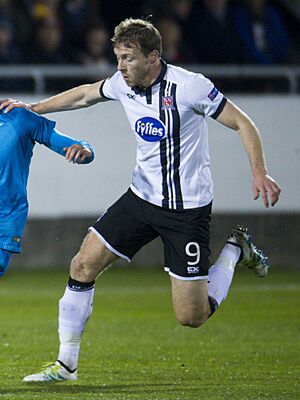
Dundalk has played in European competitions 26 times. They first played in Europe in 1963 and became the first Irish team to win an away match there. Their best performance in the European Cup was reaching the last 16 in 1979–80. They also reached the last 16 of the European Cup Winners' Cup in 1981–82. They have reached the Europa League group stage twice. In 2016–17, they were the first Irish team to earn points and win a match at that level.
They have played against famous European clubs like Liverpool, Tottenham Hotspur, Arsenal, Celtic, FC Porto, PSV Eindhoven, Ajax, and Zenit St Petersburg. They have played against teams from the Netherlands most often.
- Overall European Record
As of August 3, 2023.
| Competition | Pld | W | D | L | GF | GA |
|---|---|---|---|---|---|---|
| European Cup / UEFA Champions League | 33 | 4 | 12 | 17 | 24 | 60 |
| UEFA Cup / UEFA Europa League | 37 | 9 | 5 | 23 | 34 | 73 |
| UEFA Europa Conference League | 10 | 4 | 4 | 2 | 18 | 13 |
| European Cup Winners' Cup / UEFA Cup Winners' Cup | 8 | 2 | 1 | 5 | 7 | 14 |
| Inter-Cities Fairs Cup | 6 | 1 | 1 | 4 | 4 | 25 |
| TOTAL | 94 | 20 | 23 | 51 | 87 | 185 |
Honours
| Competition | Winners | Seasons | Runners-up | Seasons |
|---|---|---|---|---|
| National Competitions | ||||
| League of Ireland / Premier Division |
|
1932–33, 1962–63, 1966–67, 1975–76, 1978–79, 1981–82, 1987–88, 1990–91, 1994–95, 2014, 2015, 2016, 2018, 2019 |
|
1930-31, 1936-37, 1942-43, 1947-48, 1963-64, 1967-68, 1979-80, 1980-81, 1986-87, 1988-89, 2013, 2017 |
| FAI Cup |
|
1941–42, 1948–49, 1951–52, 1957–58, 1976–77, 1978–79, 1980–81, 1987–88, 2001–02, 2015, 2018, 2020 |
|
1930–31, 1934–35, 1937–38, 1986–87, 1992–93, 2016, 2017, 2019 |
| League Cup (discontinued) |
|
1977–78, 1980–81, 1986–87, 1989–90, 2014, 2017, 2019 |
|
1982–83, 1985–86, 1988–89, 1994–95 |
| League of Ireland Shield (discontinued) |
|
1966–67, 1971–72 |
|
1932–33, 1941–42, 1946–47, 1963–64, 1967–68, 1968–69 |
| Dublin City Cup (discontinued) |
|
1937–38, 1942–43, 1948–49, 1967–68, 1968–69 |
|
1935–36, 1936–37, 1940–41, 1947–48, 1965–66, 1966–67, 1970–71, 1983–84 |
| Top Four Cup (discontinued) |
|
1963–64, 1966–67 |
|
|
| League of Ireland First Division |
|
2000–01, 2008 |
|
2006 |
| President of Ireland's Cup |
|
2015, 2019, 2021 |
|
2016, 2017, 2018 |
| All-Ireland Competitions | ||||
| Champions Cup (discontinued) |
|
2019 |
|
|
| Dublin and Belfast Inter-City Cup (discontinued) |
|
1941–42 |
|
1948–49 |
| Setanta Sports Cup (discontinued) |
|
|
2011, 2014 | |
| Provincial and Junior Competitions | ||||
| Leinster Senior Cup |
|
1950–51, 1960–61, 1970–71, 1973–74, 1976–77, 1977–78, 2014–15 |
|
1928–29, 1934–35, 1935–36, 1936–37, 1938–39, 1958–59, 1961–62, 1964–65, 1966–67, 1981–82, 1993–94, 1994–95, 2016–17 |
| LFA President's Cup (discontinued) |
|
1930–31, 1951–52, 1963–64, 1964–65, 1979–80, 1980–81, 1981–82, 1988–89, 1989–90 |
|
1932–33, 1943–44, 1949–50, 1952–53, 1958–59, 1968–69, 1972–73, 1976–77, 1977–78, 1982–83, 1986–87, 1987–88, 1995–96, 2002–03, |
| Leinster Junior Cup |
|
|
1919–20 | |
| Dundalk and District League |
|
1919–20, 1920–21 |
|
1921–22 |
See also
 In Spanish: Dundalk Football Club para niños
In Spanish: Dundalk Football Club para niños
 | Madam C. J. Walker |
 | Janet Emerson Bashen |
 | Annie Turnbo Malone |
 | Maggie L. Walker |


